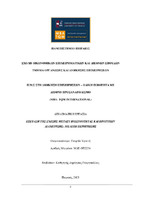Εξέταση της σχέσης μεταξύ βιωσιμότητας και προτύπων διαχείρισης : μελέτη περίπτωσης

View/
Keywords
Πρότυπα διαχείρισης ; ISO ; ΒιωσιμότηταAbstract
This master thesis examines the intricate relationship between sustainability and management standards, providing a comprehensive analysis of both theoretical foundations and practical applications in contemporary business environments. The study begins by establishing a theoretical framework for sustainability, initially exploring its conceptual definition and fundamental principles. Subsequently, it delves into the three core dimensions of sustainability: economic, environmental, and social, while addressing the current challenges organizations face in their pursuit of sustainable development. Furthermore, the research examines the international standards and frameworks that have been developed to support sustainability initiatives.
The investigation proceeds to analyze management standards related to sustainability, offering a thorough introduction to their basic concepts and principles. A detailed examination of key standard categories is presented, with particular emphasis on ISO 9001 for quality management, ISO 14001 for environmental management, and ISO 26000 for social responsibility. The study also explores the implementation and certification processes of these standards, along with the benefits and challenges associated with their adoption by organizations.
Moving forward, the research investigates the correlation between sustainability and management standards, examining the theoretical approach to their relationship and the impact of standards on achieving sustainable outcomes. The study highlights the synergies and interactions between various management systems while identifying critical success factors for their effective implementation. Additionally, the international, European, and Greek dimensions of this correlation are presented, revealing the specificities and challenges at each level.
A significant portion of the thesis focuses on analyzing how management standards contribute to organizational sustainability, exploring the mechanisms through which these standards enhance sustainable practices and foster long-term organizational resilience. The research emphasizes the importance of integrated management systems in achieving sustainability goals, demonstrating how different standards can work together to create a comprehensive approach to sustainable development. Furthermore, the study examines how organizations can effectively balance economic viability with environmental stewardship and social responsibility through the implementation of management standards.
The research methodology incorporates both theoretical analysis and empirical investigation, utilizing a case study approach to demonstrate the practical application of management standards in promoting sustainability. The case study examines a specific organization's journey toward sustainability through the implementation of management standards, providing valuable insights into real-world challenges and solutions. This practical component of the research offers concrete examples of how organizations can successfully integrate sustainability principles with management standards to achieve their strategic objectives.
The final section of the thesis presents a detailed case study, where theoretical concepts are applied to a real organization. The study thoroughly examines the organization's current state, describing the process of implementing management standards and analyzing their effectiveness. The results and evaluation of the implementation reveal both successes and challenges encountered by the organization. Based on these findings, specific recommendations for improvement are proposed to enhance the effectiveness of the applied standards and the organization's overall sustainability.
The research findings demonstrate the significant role of management standards in promoting organizational sustainability and highlight the importance of a systematic approach to implementing these standards. The study reveals that successful integration of management standards with sustainability strategies requires careful planning, commitment from leadership, and continuous monitoring and improvement of processes. Moreover, the research emphasizes the need for organizations to adapt their management systems to address emerging sustainability challenges while maintaining operational efficiency.
In conclusion, this thesis contributes to the understanding of how management standards can effectively support organizational sustainability efforts. The findings suggest that organizations that successfully implement and integrate management standards are better positioned to achieve their sustainability goals while maintaining competitive advantage. The research provides valuable insights for practitioners and researchers interested in the relationship between management standards and sustainability, offering both theoretical understanding and practical guidance for implementation. Furthermore, the study's recommendations can serve as a roadmap for organizations seeking to enhance their sustainability performance through the adoption of management standards.


